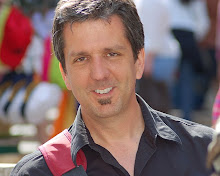You are driving in your car, and you pull up to a stoplight. Just before the light changes, another car pulls up next to you. You look over a look at that person as your sheltered, automobiled lives cross each other for an instant. It may be a man, maybe a woman - it doesn't really matter. Make it anyone you want for the purpose of this exercise. The light changes and you both zoom off on your individual ways. Maybe you'll see that person again, maybe you won't.
Now imagine being with that person in their car. Have a conversation with them. Who are they? What are their fears, hopes, dreams? Where are they going? What are they feeling? Do you like them? Does it matter? What do you see when you look over at your car from their perspective?
We live in a complex society. We all fly about in our own lives, driving like the devil, worrying about our schedule and our pocketbook, not thinking about the people like us in the car next to us, only three feet away. In the movie Crash, the Los Angeles lifestyle is given a brutally honest (and depressingly tragic) treatment where people are forced out of the comfort zone of their automobiles and into an uncomfortable relationship with the drivers next to them.
Our lives form a cross-connecting polyphony of different arcs and trajectories, different keys and rhythms, different modes of expression. And yet we really all share a very similar story, rooted in a common culture, with similar fears, goals, and the realization that - when all is said and done - this musical journey we call life will someday come to and end.
This is why Bach is important. There is no simplicity in Bach. His music is the music of complexity and interconnectivity. If we allow ourselves to get inside of Bach's music, he can show us the weaving fabrics of our lives' melodies. And we can begin to understand that the resulting harmony and texture of those melodies is the music of the cosmos, a glorious consonance and dissonance that exists for one reason only: in Bach's words: Soli Dei Gloria. "Only for the glory of God."
Friday, March 20, 2009
Sunday, March 15, 2009
Songs
I just finished listening to the final mixes of the 13 songs that will be on "Musical Moonshine", and I had an interesting experience: I wanted to hear them again. There's much less musicial polish on these songs (all of them were recorded at home with one mic, no mic preamp, three guitars and a mandolin - no other instruments), but they sparkle to me. What's surprising is that these songs have been with me for a while, some of them for anywhere from 3 to 7 years. I have performed them dozens of times, and I haven't gotten tired of them.
There was a real sense of pride in these songs for me. I think they represent the best songwriting I've ever done. Some of them are experimental, while others are very straightforward, but they all work for me on some level.
I also have a better handle on the relationship between song and songwriter this time. I have always felt that songs were like children: you raise them up, and then let them go into the world, hopefully to touch other lives in a positive way. But this set, more than any other, feels like they are a part of me, maybe even a part I didn't know existed. I listen to One-Time Lover, a song about a rambling lothario and realize that - even tho I'm not a rambling lothario - there's a part of me in that cad. Or Washing Away, a stream of consciousness song that I realized yesterday is based in an experience I had four years ago. And the songs that are based on my relationship with Lynda are as simultaneously autobiographical and universal as I think any songs can be.
So it's almost time for me to send these children out to the world. But this batch is perhaps a little more mature and ready for the world than any I've done before, and they make me a very proud papa.
There was a real sense of pride in these songs for me. I think they represent the best songwriting I've ever done. Some of them are experimental, while others are very straightforward, but they all work for me on some level.
I also have a better handle on the relationship between song and songwriter this time. I have always felt that songs were like children: you raise them up, and then let them go into the world, hopefully to touch other lives in a positive way. But this set, more than any other, feels like they are a part of me, maybe even a part I didn't know existed. I listen to One-Time Lover, a song about a rambling lothario and realize that - even tho I'm not a rambling lothario - there's a part of me in that cad. Or Washing Away, a stream of consciousness song that I realized yesterday is based in an experience I had four years ago. And the songs that are based on my relationship with Lynda are as simultaneously autobiographical and universal as I think any songs can be.
So it's almost time for me to send these children out to the world. But this batch is perhaps a little more mature and ready for the world than any I've done before, and they make me a very proud papa.
Subscribe to:
Comments (Atom)
